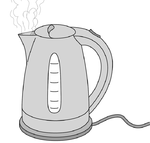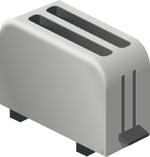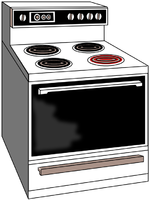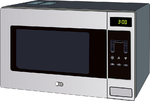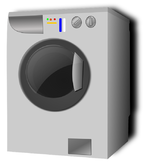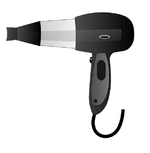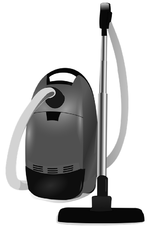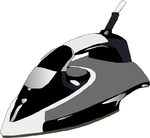Electrical Appliance
Contents
Key Stage 2
Meaning
An electrical appliance is anything that needs electricity to work.
About Electrical Appliances
- Electrical appliances often have a plug to use the Mains Electricity.
- Some electrical appliances use electrical cells to power them.
Examples
| Kettle | Television | Refrigerator | Toaster |
| Oven | Microwave | Washing Machine | Hair Dryer |
Key Stage 3
Meaning
An electrical appliance is anything that needs electricity to work.
About Electrical Appliances
- Electrical appliances often have a plug to use the Mains Electricity.
- Some electrical appliances use electrical cells to power them.
Power Ratings
| Filament Bulb ~ 60Watts | Energy Saving Bulb ~ 25Watts | Vacuum Cleaner ~ 800Watts | Iron ~ 1100Watts |
| Kettle ~ 2000Watts | Television ~ 250Watts | Refrigerator ~ 200Watts | Toaster ~ 1500Watts |
| Oven ~ 2500Watts | Microwave ~ 1000Watts | Washing Machine ~ 2500Watts | Hair Dryer ~ 600Watts |
Energy Usage of Appliances
- The amount of energy an appliance uses depends on the power rating and how long the appliance is used for.
- Energy usage for appliances is measured in kilowatt-hours. This means all power ratings need to be in kilowatts and time should be in hours.
- Energy can be calculated with the equation: Energy = Power x time
| Filament Bulb
A 60Watt filament bulb may be used for 8 hours a day. Calculate the energy in kilowatt-hours. |
Energy Saving Bulb
A 25Watt energy saving bulb may be used for 8 hours a day. Calculate the energy in kilowatt-hours. |
Kettle
A 2000Watt kettle may be used for 30 minutes a day. Calculate the energy in kilowatt-hours. |
|
|
|
| Television
A 250Watt television is left on for 3 hours each day. Calculate the energy in kilowatt-hours. |
Refrigerator
A 200Watt refrigerator is on for 24 hours each day. Calculate the energy in kilowatt-hours. |
Oven
A 2500Watt oven is used for 45 minutes each day. Calculate the energy in kilowatt-hours. |
|
|
|
Key Stage 4
Meaning
An electrical appliance is any device that needs electricity to work.
About Electrical Appliances
- Electrical appliances often have a plug to use the Mains Electricity.
- Some electrical appliances use electrical cells to power them.
Energy Transfers
| Electrical energy transfer → Thermal Energy Store of the bulb. | Electrical energy transfer → Thermal Energy Store of the bulb. | Electrical energy transfer → Kinetic Energy Store of the air and the Thermal Energy Store of the motor. | Electrical energy transfer → Thermal Energy Store of the metal pad. |
| Electrical energy transfer → Thermal Energy Store of the water and kettle. | Electrical energy transfer → Energy Transfer by radiation to the surroundings (by light and sound). | Electrical energy transfer → Thermal Energy Store of the 'heat pump' at the back of the refrigerator. | Electrical energy transfer → Thermal Energy Store of the bread/toast. |
| Electrical energy transfer → Thermal Energy Store of the oven and food. | Electrical energy transfer → Thermal Energy Store of the food. | Electrical energy transfer → Thermal Energy Store of the bulb. | Electrical energy transfer → Thermal Energy Store and Kinetic Energy Store of the air. |
